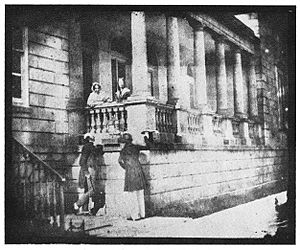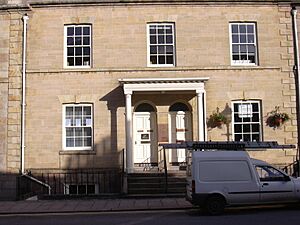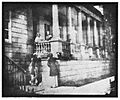Charles Lemon facts for kids
Quick facts for kids
Sir Charles Lemon
|
|
|---|---|

Early photograph showing people, including Sir Charles Lemon, bottom left, at Carclew. Taken in August 1841 by Henry Fox Talbot, Charles' nephew
|
|
| Born | 3 September 1784 |
| Died | 13 February 1868 (aged 83) |
| Nationality | British |
| Occupation | Politician |
| Spouse(s) | Lady Charlotte Ann Foxstrangways |
| Children | Charles William (died aged 13 months) Charles William (died aged 12) Charlotte Augusta Caroline (died aged 10) |
| Parent(s) | William Lemon Jane Buller |
Sir Charles Lemon (born September 3, 1784, died February 13, 1868) was an important British politician. He served as a Member of Parliament (MP) for many years and held the title of a baronet. This means he inherited a special honor from his father. He was known for his work in politics and for supporting science and education.
Contents
Sir Charles Lemon's Early Life
Charles Lemon inherited his title as the 2nd Baronet in 1824 when his father, Sir William Lemon, passed away. He also inherited Carclew House, a large family home. His mother was Lady Lemon. She was the oldest daughter of James Buller, who was also an MP for Cornwall. Charles went to Harrow School, a well-known school in England.
Charles Lemon's Political Career
Sir Charles Lemon was a Member of Parliament (MP) for a long time. An MP is someone elected to represent people in the British Parliament, helping to make laws for the country.
Representing Cornwall
He first represented the area of Penryn in Cornwall from 1807 to 1812. He was elected again for Penryn from 1830 to 1831. In 1831, he joined the Whig party. The Whigs were a major political group in Britain at the time. He then became an MP for Cornwall until 1832. After a big change in voting rules called the Reform Act 1832, he became the Whig MP for West Cornwall. He held this position until 1841. He was elected again for West Cornwall in 1842 and served until 1857.
Important Roles and Contributions
In 1827, Sir Charles Lemon was chosen as the High Sheriff of Cornwall. This was an important local role, responsible for keeping law and order. In 1836, he led a group from Falmouth to ask the government to keep the Post Office Packet Service in their town. This service delivered mail across the world by ship.
In 1837, he joined a special committee in Parliament. This committee looked into the system of sending criminals to faraway colonies. He also became a deputy Warden of the Stannaries in 1852. This role involved overseeing tin mining in Cornwall. He also helped fund the start of what is now the Camborne School of Mines, a famous mining college.
Legacy and Recognition
Sir Charles Lemon's name is still remembered in Truro, Cornwall. There is a "Lemon Street" and "Lemon Quay" named after him. He also bred a type of rhododendron flower called Sir Charles Lemon. He grew it from seeds collected by the famous botanist Joseph Dalton Hooker.
Supporting Science and Education
Sir Charles Lemon was very interested in science and learning.
- He became a Fellow of the Royal Society in 1822. This is a very old and respected group for scientists.
- He was the second president of the Royal Statistical Society from 1836 to 1838. This group focuses on collecting and understanding data.
- He spoke at a meeting of the British Association in Newcastle in 1838.
- He was president of the Royal Geological Society of Cornwall from 1840 to 1856. This society studies the rocks and land of Cornwall.
- He was also president of the Royal Cornwall Polytechnic Society from when it started until he died. This society promotes science, art, and industry.
- He led the Falmouth Board of Guardians from 1837 until his death. This group helped care for the poor.
He was also on the management committee for the South Western Railway in 1836.
Freemasonry
Sir Charles Lemon was an important Freemason in Cornwall. Freemasonry is a social and charitable organization. He joined a lodge in Falmouth in 1840. He became its leader in 1843. In 1844, he was appointed the main leader for all Freemasons in Cornwall. He held this position until 1863.
Sir Charles Lemon's Family Life
On December 5, 1810, Sir Charles Lemon married Lady Charlotte Ann Fox-Strangways. She was the fourth daughter of a nobleman, Henry Thomas Fox-Strangways, 2nd Earl of Ilchester.
They had two sons, both named Charles William, but sadly, both died young.
- Their first son passed away when he was only 13 months old.
- Their second son drowned at Harrow School when he was twelve years old.
- Their daughter, Charlotte Augusta Caroline, also died young at the age of 10 in 1825.
Death and Legacy
Sir Charles Lemon passed away on February 13, 1868. Because he had no children who survived him, his title as a baronet ended with him. Most of his property and wealth went to his nephew, Colonel Arthur Tremayne. Arthur Tremayne was the son of Sir Charles's sister, Caroline. Colonel Tremayne was a hero from the Crimean War and survived the famous Charge of the Light Brigade.
Images for kids
 | Bessie Coleman |
 | Spann Watson |
 | Jill E. Brown |
 | Sherman W. White |




